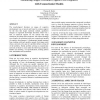Free Online Productivity Tools
i2Speak
i2Symbol
i2OCR
iTex2Img
iWeb2Print
iWeb2Shot
i2Type
iPdf2Split
iPdf2Merge
i2Bopomofo
i2Arabic
i2Style
i2Image
i2PDF
iLatex2Rtf
Sci2ools
107
click to vote
ICML
1991
IEEE
1991
IEEE
Simulating Stages of Human Cognitive Development With Connectionist Models
The psychological literature on stages of cognitive development was reviewed and found to contain support for the idea that stages represent ordinal, qualitative changes in organized knowledge structures. There was a lack of empirical support for the notions that stage transitions are abrupt and concurrent. All of these findings were found to be consistent with new connectionist models of cognitive development. A fundamental insight emerged from working with such models, namely, that stages result when a network solves part of a problem before solving all of the problem. Partial problem solving in connectionist networks is likely to occur under the following conditions: hidden unit herding, over-generalization, training pattern bias, and hidden unit recruitment.
Cognitive Development | ICML 1991 | Machine Learning | Psychological Literature | Qualitative Changes |
Related Content
| Added | 27 Aug 2010 |
| Updated | 27 Aug 2010 |
| Type | Conference |
| Year | 1991 |
| Where | ICML |
| Authors | Thomas R. Shultz |
Comments (0)

